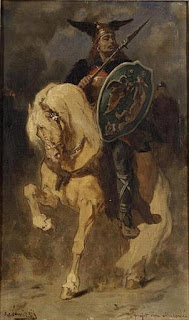Merovech (aka Mérovée, Merowig, and in Latin Meroveus) was on the scene from about 411 until 458 CE. He was king of the Salian Franks, the tribe that became the primary tribe in France. Details are hazy, but his father may have been Chlodio, also king of the Salian Franks.
The Roman historian Priscus, writing about the conflicts between Attila the Hun and Rome, mentions a beardless youth with long hair adopted by Roman general Aetius. This turns out to be Merovech, looking for Roman support in his bid to succeed Chlodio. His rival was his elder brother who aligned with Attila the Hun. The Romans fought the Huns in Gaul, and Merovech became king.
At some point, it apparently became necessary to enhance Merovech's origin. The Chronicle of Fredegar states that Chlodio and his queen were at the sea shore when she went bathing. She was attacked by a sea creature and became pregnant with Merovech. Adding a veneer of divinity wasn't unusual in the Classical and Medieval periods to elevate a ruler's reputation. This origin was adopted and exaggerated by writers in the 20th century to link Merovech to the bloodline of Jesus, to the Illuminati, to Masonic lore, and to horror fiction.
But all this is largely...legendary. The Merovingian dynasty—although named for Merovech—starts officially with Childeric I. He is next up.

